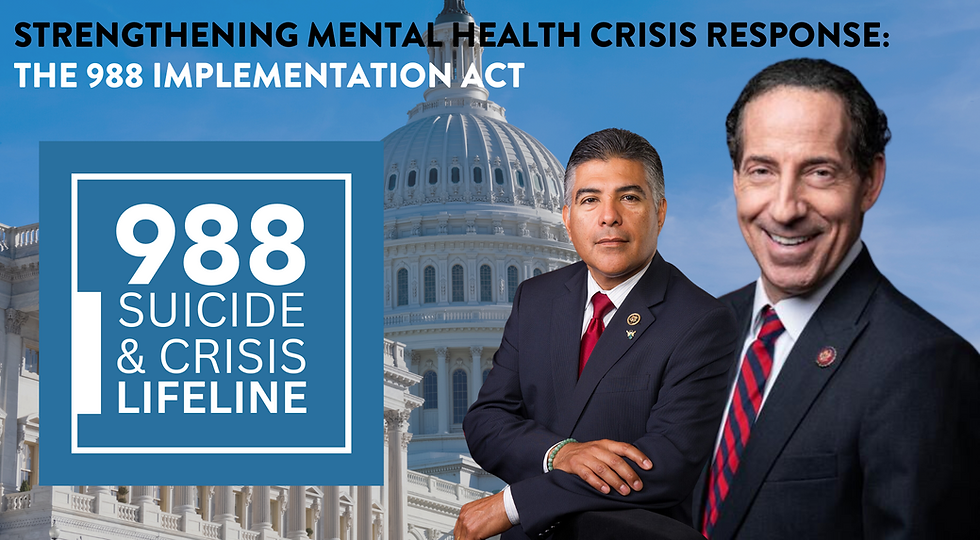Strengthening Mental Health Crisis Response: The Federal 988 Implementation Act
- The Miles Hall Foundation

- Jul 24, 2023
- 2 min read

Addressing the Mental Health Crisis
The introduction of the 988 Implementation Act represents a significant effort to bolster mental health crisis response in the United States. This bipartisan legislation is aimed at fortifying the recently established 988 Suicide & Crisis Lifeline, ensuring it can effectively support individuals in need of urgent mental health assistance.
The Urgent Need for Action
The United States is grappling with a mounting mental health crisis, with suicide ranking as a leading cause of death, especially among young people. Despite the availability of the 988 Lifeline as a critical resource, there remains a pressing need to enhance crisis response efforts and connect individuals with appropriate support services.
Taun Hall and the Miles Hall Foundation: Advocating for Change
Taun Hall, the mother of Miles Hall, has emerged as a prominent advocate for mental health reform following the tragic loss of her son during a police encounter amid a mental health crisis in 2019. As the Executive Director of the Miles Hall Foundation, her efforts have transcended personal tragedy to drive national attention towards the need for alternative responses to mental health emergencies. Taun is quoted in Congressman Jamie Raskin (MD-08) and Congressman Tony Cárdenas (CA-29) press release in support of the 988 Implementation Act.
“Having a system that didn’t rely on police to take care of mental health crises would have most likely saved my son, Miles Hall, who was killed on June 2, 2019, after we called 911 for assistance getting him to the hospital,” said Taun Hall.
“This new legislation gives families like ours a chance for a medical response to mental health challenges instead of criminalization. I miss Miles every day and wish he was alive and enjoying his life.
Thank you, Tony Cárdenas for creating this life-saving legislation which will give all states the federal support, guidance and funding to ensure public safety for all.”
The Provisions of the 988 Implementation Act
The 988 Implementation Act outlines several key provisions aimed at strengthening mental health crisis response:
Funding Allocation: The act allocates funding to ensure round-the-clock response capabilities for regional and local call centers.
Community-Based Services: Funding is earmarked for mobile crisis teams and crisis stabilization centers, extending support beyond the confines of call centers.
Workforce Development: The legislation invests in training and scholarships to bolster the mental health workforce and enhance crisis response capabilities.
Insurance Coverage Mandate: Health insurance plans are mandated to cover crisis services, thereby improving access to essential mental health care.
National Awareness Campaign: A comprehensive national campaign will be launched to raise public awareness of the 988 Lifeline and its available resources.
Endorsed by numerous mental health organizations, the 988 Implementation Act signals a concerted effort to address the pressing challenges facing mental health crisis response in the United States. Through increased resources, expanded services, and heightened awareness, this legislation holds the potential to save lives and foster improved mental health outcomes nationwide.









Comments